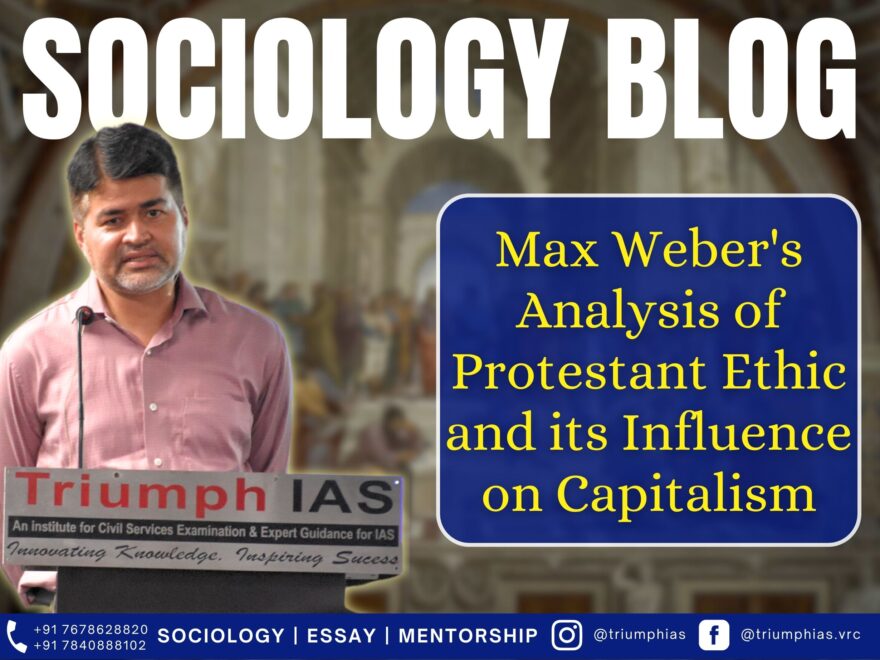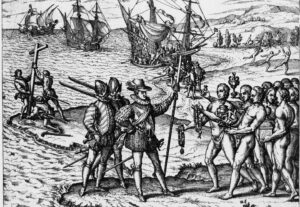
Max Weber was a renowned German sociologist who is best known for his thesis combining economic sociology and the sociology of religion. Weber’s most significant work, “The Protestant Ethic and the Spirit of Capitalism,”
Protestant Ethic and the Spirit of Capitalism
(Relevant for Sociology Optional Paper 1 (Unit 4))
To overcome the methodological challenge of defining Capitalism and Protestant Ethic (Religion and Economy), Max Weber utilized the concept of an ideal type. The Protestant Ethic does not pertain to any specific theological doctrine, but rather encompasses a set of values and belief systems that form a religious ideal. Capitalism, in its ideal type, is conceptualized by Weber as a complex endeavor aimed at maximizing profit through the deliberate and rational organization and management of production. Although economic enterprises driven by profit existed worldwide, Western capitalism possesses unique characteristics. These include the notion of unlimited accumulation surpassing mere maximum profit and the conviction that the pursuit of profit should be restrained by discipline and science, rather than speculation and adventure.
- Weber’s theory stands as a significant contribution to historical sociology. It exemplifies the application of Weber’s methodological principles, such as causal pluralism, ideal types, and the verstehen approach. In addition to examining the nature of two crucial sociological phenomena, religion and modern capitalism, it lays the foundation for an alternative theory of social change that emphasizes the independent influence of ideas.
- Weber departs from the contemporary Marxist perspective, which attributes the ultimate cause of all social change to the economic substructure. He argues that such a one-sided view oversimplifies the complexity of social reality. No social phenomenon can be adequately explained by a single cause alone, as each is the result of multiple interacting factors. According to Weber, the Marxist view on the development of capitalism can be seen as an ideal type construct that highlights the role of economic factors contributing to the rise of capitalism.
- He also challenges Engel’s viewpoint that Protestantism emerged in Europe as a legitimizing ideology for nascent capitalism that had already emerged. Instead, Weber emphasizes the role of ideals as an independent catalyst for change. Disputing Engel’s argument, Weber states that capitalism existed in embryonic forms in Babylon, Rome, China, and India, and in certain stages of their history, other material conditions necessary for capitalism’s development were also present in China and India. However, the emergence of modern capitalism is unique to Western society. The question arises as to why these embryonic forms developed into modern capitalism solely in the West and not elsewhere. An explanation based solely on the internal dynamics of economic forces fails to account for this peculiarity. It becomes essential to consider the specific ethos of early European capitalist entrepreneurs, which was absent in other civilizations.
- Building upon an analysis of statistical records, Weber starts with the statistical fact that business leaders, capital owners, and highly skilled labor personnel in modern enterprises were predominantly Protestant. This association is not only a contemporary phenomenon but also a historical reality, tracing back to the early centers of capitalist development in the 16th and 17th centuries. After establishing the statistical relationship between the Protestant population and the development of capitalism, Weber proceeds to explore the logical connection between the two. He delves into the beliefs and practices of specific Protestant groups, particularly Calvinists, whose way of life was characterized by asceticism. Weber elaborates on these motivations through the creation of an ideal type, aiming for internal coherence while recognizing its divergence from historical reality. Through this rational utopia, Weber seeks to comprehend how these motivations operate in actuality as well.
The initial motivation behind Weber’s renowned work, “The Protestant Ethnic and the Spirit of Capitalism” (1904-1905), revolved around two broad observations. Firstly, in numerous locations worldwide, significant material accomplishments had been achieved through the efforts of monastic orders committed to a spiritual existence. Secondly, ascetic Protestant sects were particularly known for their economic prosperity. This seeming association between ascetic religious convictions and economic endeavors presented a paradoxical situation. As Weber focused on Calvinism, he started to discern undeniable indications of causal connections.

Weber identified a number of values embedded in Protestantism which are in harmony with the spirit of capitalism.
- The transition from a focus on rituals and otherworldly matters to a practical and pragmatic approach: The limited human mind cannot fully grasp the infinite mind of the absolute and transcendent God, who created the world for His own glory. Therefore, indulging in mysticism becomes pointless; instead, humanity should strive to comprehend the natural order. This anti-ritualistic perspective promotes the advancement of science and rational inquiry.
- A revised perspective on work ethic: The Protestant Ethic views work as a virtue, not only as something good and desirable, but also as a contribution to the glory of God. Since Adam and Eve were expelled from the Garden of Eden with the punishment of earning their livelihood through sweat, the Catholic ethic regarded work as a punitive necessity, a reminder of the original sin, and valued leisure instead. In contrast, the Protestant Ethic not only encourages productive endeavors, but also emphasizes that work itself is a virtue, as it contributes to the glory of God.
- The notion of a calling: This idea originated from the Calvinist doctrine of predestination, which posits that each soul is predestined for heaven or hell from birth, and that nothing an individual does in life can alter their ultimate fate. However, there are signs through which God indicates to each individual whether they are among the elect, with success in life being a significant indicator. Since everyone is eager to ascertain their status of salvation or damnation, they should choose a calling, dedicate themselves to it, work hard, and achieve success. This doctrine had a profound economic impact. No longer was it necessary for “religious” individuals to take vows of poverty, enter monasteries, undertake pilgrimages, or engage in self-torture, which were popular means of salvation in Catholicism during the Middle Ages. The new doctrine urged people to pursue profitable ventures, accumulate wealth, and demonstrate their destiny.
- A revised perspective on the collection of interest on loans: Catholic theology prohibited the collection of interest on loans, which discouraged the operation of lending institutions and the accumulation of capital. However, Calvinism approved of this practice, which had been forbidden in Catholicism. This endorsement fostered an upsurge in economic activity, including the establishment of lending institutions, new investments, and the growth of floating capital.
- Restrictions on alcohol consumption: The Protestant ethic prohibits the consumption of alcoholic beverages, whereas Catholicism lacks a comparable theological doctrine. In fact, the prohibition movement in Western societies has always been spearheaded by Protestant groups.
- Encouragement of literacy and education: Based on the belief that every individual should read the Bible independently rather than relying on priestly interpretations, the Protestant ethic places great emphasis on literacy and learning. This emphasis led to significant advancements in education, shifting from the education of clergy to mass education and the development of specialized skills.
- Rejection of holidays: The Catholic calendar is filled with holy days, and nearly every holy day is a holiday. This aligns with the Catholic belief that leisure time is necessary to honor God through ritualistic celebrations. However, since work contributes to the glory of God in the Protestant ethic, holy days and celebrations are deemed unnecessary. Consequently, factories and other businesses can operate seven days a week throughout the year, maximizing the utilization of capital and other investments, thereby enhancing productivity.
- Protestant asceticism: The Protestant ethic also incorporates the notion that worldly possessions and physical desires belong to the realm of sin and death. Therefore, individuals should refrain from indulging in worldly pleasures. On one hand, the Protestant ethic encourages the ceaseless pursuit of profit, but on the other hand, it discourages using wealth for personal enjoyment. This relentless pursuit of profit, not for the sake of indulging in life’s pleasures, but purely for the satisfaction of increasing production, becomes a quintessential condition for the development of capitalism.
Comparative Study of Other Religion:
Now having established the essential harmony between Protestant ethic and the spirit of capitalism, Weber turned to other religions to see if there is in them a discernible cluster of values comparable to Protestant ethic that is favourable to the rise of capitalism. He found a variety of non-religious social and economic conditions conducive to the development of capitalism in China and India but the ethical system of Confucianism and the doctrine of karma in Hinduism were not particularly favourable. Moreover, the combination of religious values that constituted the Protestant ethic was unique: an unusual blend of two apparently inconsistent notions; namely limitless accumulation of wealth and abstention from enjoyment.
He followers of Hinduism did not have any interest in material and worldly success. For the same reason, the followers of Hindu religion stood first in the world for spiritual progress, instead of worldly progress. Hindu religion is based on the doctrine of (Dharma Karma and Punarjanama). The principle of Karma says that man gets the fruit of sin and piety in the next birth. But to get rid of cycle of birth and rebirth he will have to devote to religion and to God at maximum. In this way, Hinduism stresses on other worldly asceticism.
Similarly Islam, has been emphasized proper use of wealth in that no single people can have the disproportion to property.
- In Confucianism or Buddhism there is a focus on right knowledge through right action and right mediation. It says that only right knowledge will solve all kinds of problems and related with life and not the wealth which will do so.
- In Catholicism people are discipline in the way that they couldn’t think about change and self constructions. These valus have been obstructions in the development of capitalism.
- The followers of Judaism have always migrated from one place to another with the desire of getting lot of money and everywhere they work hard and but were highly greedy so were left isolated from the system. Therefore, they couldn’t become capitalists.
Critical Evaluation
- R.H. Tawney, a renowned English historian, has highlighted that Weber’s interpretation of Protestantism relied on a narrow range of empirical evidence. He points out that England was the first country to embrace capitalism, but the English Puritans did not adhere to the doctrine of predestination.
- Furthermore, there were aspects of traditional Catholic teachings that were compatible with capitalism as well. However, the spread of capitalism was sluggish in certain Catholic-dominated regions. Weber seems to have overlooked significant developments within Catholicism that occurred after the Reformation and contributed to its modernization.
- Another contradiction in Weber’s thesis on capitalism is that it necessitates both the consumption of goods and saving for future investment. Protestant asceticism promotes the latter, while the former may require hedonism. Additionally, contemporary capitalists are no longer driven by inner-worldly asceticism; rather, modern-day lifestyles are increasingly hedonistic.
- Critics of Weber’s theory, such as T.C. Hall, argue that the accumulation of wealth cannot be solely attributed to Calvinist values. They point out that Calvinism is strongly prevalent among the people in the Scottish Highlands and hilly regions of South America, yet these regions are characterized by poverty. This demonstrates that religious beliefs alone do not guarantee wealth; instead, socioeconomic conditions play a significant role.
To master these intricacies and fare well in the Sociology Optional Syllabus, aspiring sociologists might benefit from guidance by the Best Sociology Optional Teacher and participation in the Best Sociology Optional Coaching. These avenues provide comprehensive assistance, ensuring a solid understanding of sociology’s diverse methodologies and techniques
Max Weber, Protestant Ethic, Spirit of Capitalism, Ideal Types, Religion and Economy, Historical Sociology, Capitalist Development, Calvinism, Protestant Values, Work Ethic, Interest on Loans, Protestant Asceticism, Comparative Religion, Critique of Weber’s Theory


